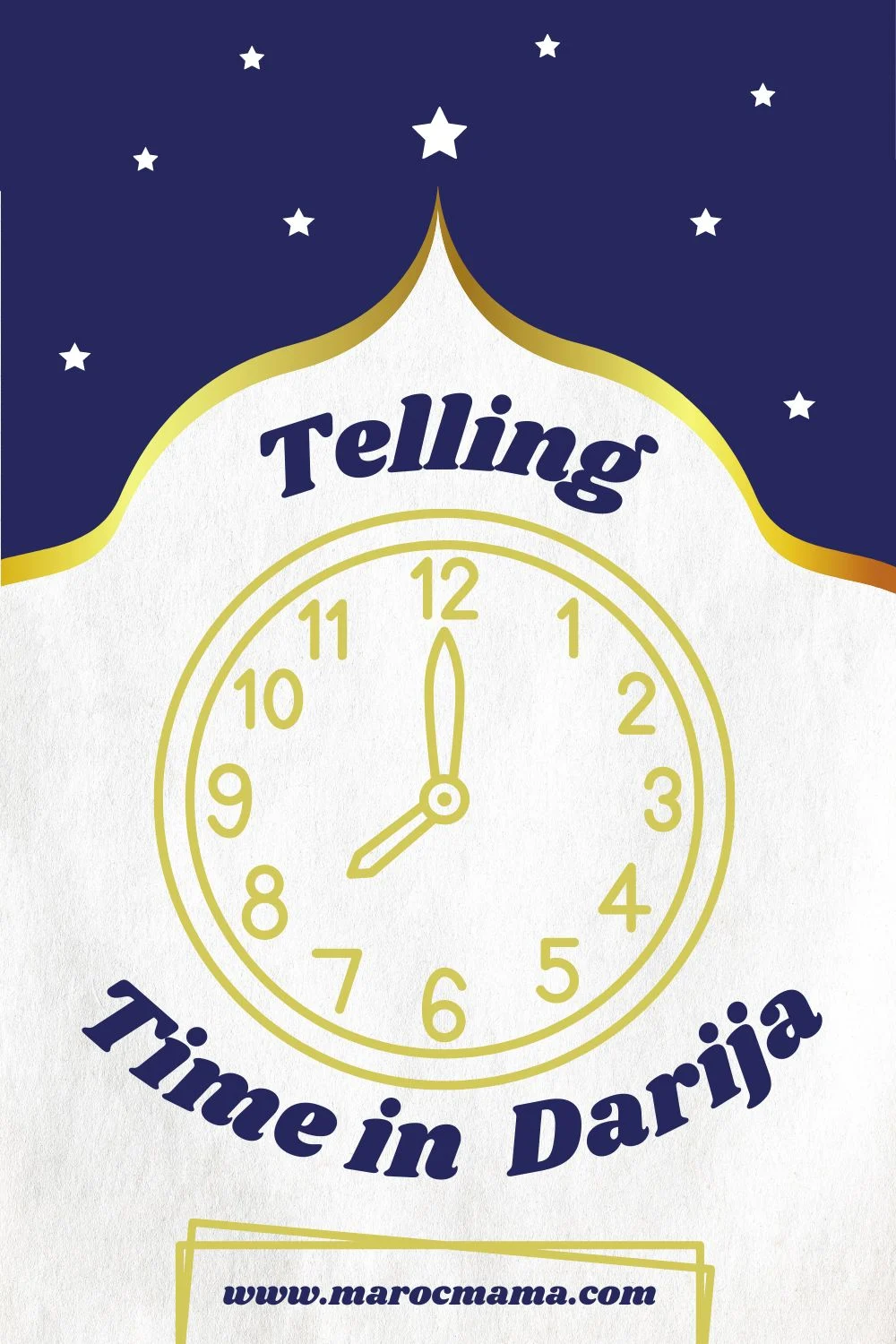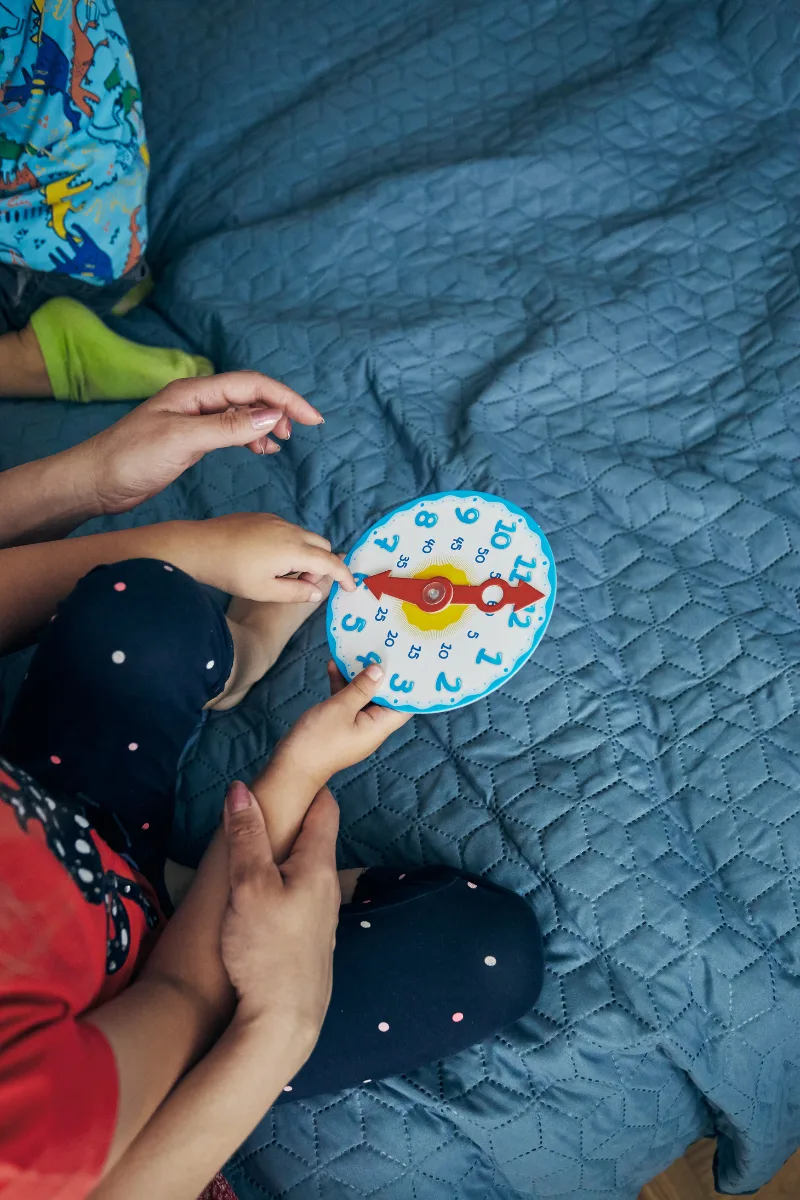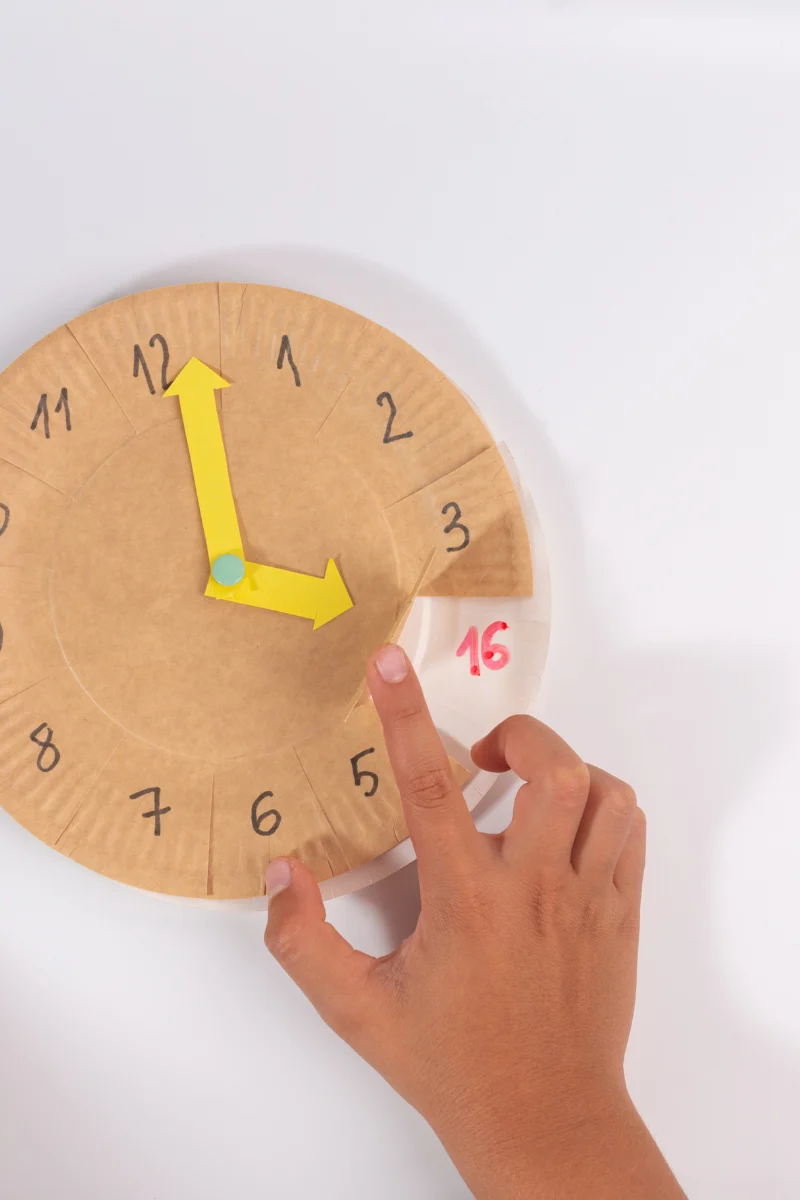Today I’m sharing some basic vocabulary that relates to numbers and telling time. Learning numbers was one of the best and most important things I learned. It makes bartering in the markets and generally understanding prices and transactions so much easier.
I also found being able to ask and know what time it was to be helpful. It might not seem like an issue when everyone has a phone with digital time on it but you’ll be surprised how often this comes in handy.

Learning how to tell time in Moroccan Arabic is an important part of getting around and communicating with locals in Morocco. In this post, we’ll go over the basics of telling time in Darija, the dialect of Arabic spoken in Morocco.
Numbers in Moroccan Arabic
To tell time in Darija, you’ll need to know the numbers from 1 to 12. We’ll go over these numbers, how to pronounce them, and how to combine them with other words to indicate time.
- 0 – Sifr (see-fur)
- 1 – Wahed (wah-hed)
- 2 – Juj (jooj)
- 3 – Tleta (tel-et-ah)
- 4 – Arba (ar-bah)
- 5 – Khamsa (kham-sah)
- 6 – Setta (set-tah)
- 7 – Sabaa (sah-bah-ah)
- 8 – Tamanya (tah-man-yah)
- 9 – Tissa (tis-sah)
- 10 – Ashra (ash-rah)
- 11 – Hdaash (had-ash)
- 12 – Thnaash (thnash)
It’s important to note that these numbers may be pronounced slightly differently depending on the region and dialect of Moroccan Arabic. However, the above pronunciations are generally understood throughout Morocco.
Telling Time on the Hour In Moroccan Arabic
The basic way to tell time on the hour is to say the hour followed by the word for “o’clock.” We’ll show you examples of how to say each hour in Darija, along with some common variations and expressions.
In Moroccan Arabic, the most basic way to tell time is by using the hour followed by the word for “o’clock.” For example, to say “It’s 1 o’clock,” you would say “Wahed l-saa.” Here, “wahed” means “one,” and “l-saa” means “o’clock.” Similarly, “ithnan l-saa” means “2 o’clock,” “thalatha l-saa” means “3 o’clock,” and so on up to “ashara l-saa” for “10 o’clock.”

It’s important to note that in Moroccan Arabic, the pronunciation of some numbers may differ slightly from standard Arabic. For example, the number “two” is typically pronounced as “jouj” instead of “ithnan.” Similarly, “three” is often pronounced as “tlata” instead of “thalatha.”
In addition to the basic structure of telling time, there are also some common variations and expressions used in Moroccan Arabic. For example, these are some common expressions of time;
- “It’s half past the hour,” you would say “niS l-saa” (literally, “half of the hour”).
- To say “quarter past the hour,” you would say “rub3 l-saa” (literally, “a quarter of the hour”),
- and to say “quarter to the hour,” you would say “9ariba men rub3 l-saa” (literally, “close to a quarter of the hour”).
Telling Time with Minutes in Darija
To continue telling time in Moroccan Arabic, it’s important to know how to express minutes past the hour. The preposition “li” is used to signify “past” and is followed by the number of minutes. For example, if it’s 1:15, you would say “wa7ed w li khamsa” (واحد و لي خمسة).
To express quarter past the hour, you can say “ruba3” (ربع) which means quarter, followed by “li” and the number of the hour. For example, if it’s 3:15, you would say “tlata w ruba3 li thlatha” (تلاتة و ربع للثلاثة).
To express half past the hour, you can use the word “nus” (نص) which means half. For example, if it’s 2:30, you would say “jouj nus” (جوج نص).
It’s also important to note that in Moroccan Arabic, it’s common to round up when telling time. So if it’s 1:50, it’s common to say “ta3ala l-w7da” (تعالى الوحدة), which means “come to the one” instead of saying “wa7ed w khamssa wa 3ishroun daqiqa” (واحد وخمسة وعشرون دقيقة).
Telling Time with “Less Than” in Darija
In Darija, to express a time that is “less than” a certain hour, you use the preposition “taht” followed by the next hour. For example, “taht tlata” means “less than 3” or “before 3.” To express a specific number of minutes before the next hour, you can use the preposition “gulo” followed by the number of minutes. For example, “gulo khamsa taht tlata” means “5 minutes to 3.”
It’s also common in Darija to use the phrase “half” (nefs) or “quarter” (rub’) to express times that fall between hours. For example, “sitta nefs” means “half past 6” and “rub’ sbaa” means “quarter past 7.” Additionally, you can use the phrase “a little more” (shwia ziyada) to express times that fall slightly after the hour. For example, “tlata shwia ziyada” means “a little after 3.”
One thing to note is that the use of the 24-hour clock is not common in Darija. Instead, the 12-hour clock is used and times are typically referred to as “morning” (sbah), “afternoon” (l’ghriba), and “evening” (msaa) to differentiate between AM and PM.

Telling Time in Different Contexts in Morocco
When it comes to expressing time of day, it can be helpful to understand how to distinguish between morning, afternoon, and evening times. In Moroccan Arabic, “sabah” is used to refer to the morning hours, “l-aser” to the afternoon hours, and “l-ashiya” to the evening hours.
To ask for the time in Darija, you can use the phrase “sh7aal sa3a?” which means “what’s the time?” or “kantmanaach sh7aal?” which means “do you know what time it is?” When someone tells you the time, you may hear them use expressions like “b3da l-3asr” to mean “afternoon,” or “lila” to mean “evening.”
It’s also important to note that while Moroccan Arabic has a standard way of telling time, there are regional differences and variations in different areas of the country. So, don’t be surprised if you hear someone express time in a slightly different way than what you have learned. As with any language, the best way to improve your skills is through practice and immersion, so try to use the phrases and structures you learn as much as possible when speaking with native speakers.
By learning how to tell time in Moroccan Arabic, you’ll be able to navigate your way around Morocco more easily and communicate more effectively with locals. With a little practice, you’ll soon be able to master the basics of Darija time-telling and impress your Moroccan friends with your language skills!
**Disclaimer, I am learning Darija and am not a native speaker. I am the first to admit there may be mistakes here, but I have had these reviewed by native speakers. Know that words will be pronounced differently in different parts of Morocco. I don’t intend for this to be an all encompassing learning resource, it’s simply material to get you started. You can visit my Language page for even more resources.
Kate
Saturday 26th of April 2014
I am longing to be in Morocco so I am a huge fan of your blog.
Tracy
Saturday 26th of April 2014
Thanks for this! I love these lessons. I'm doing Rosetta Stone Arabic right now, and, coincidentally, have just finished the lesson on telling time. It's interesting to note the similarities and differences between your Darija lesson and the Rosetta MSA lesson. And the similarities to Spanish. Fascinating. Thanks for sharing your experiences with Morocco. Shukran lakhi!
Kesley
Saturday 26th of April 2014
I love this! I also liked how last time you included how to say the words phonetically in parentheses. That was really helpful! Thanks so much for posting!